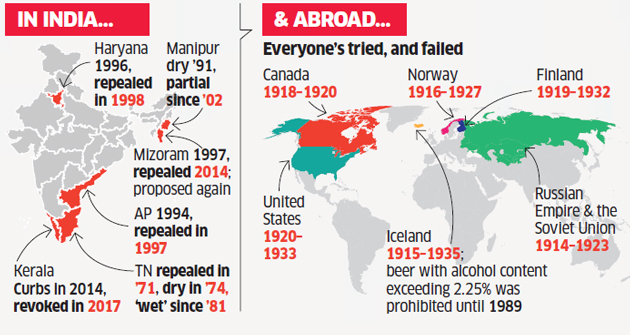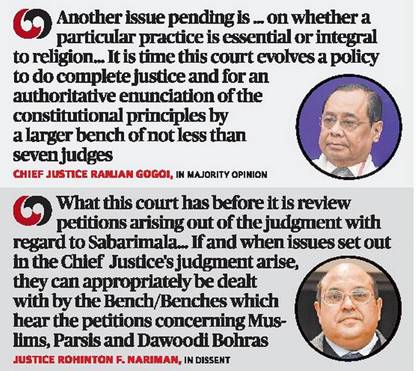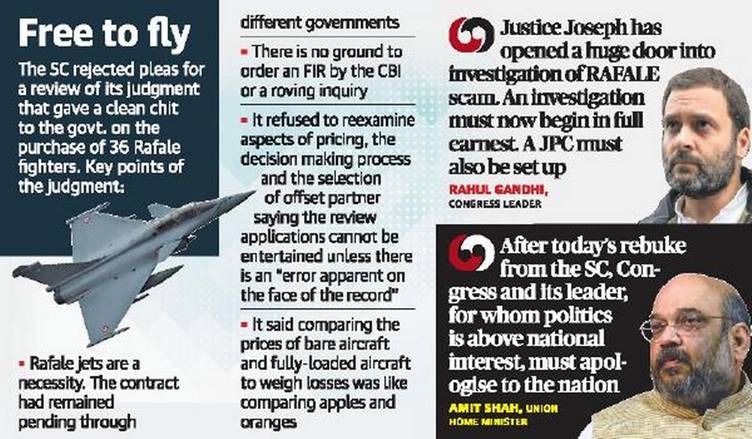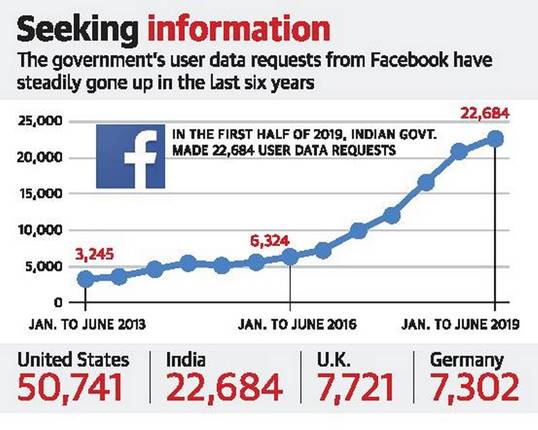



Explained: From alcohol ban to opening pubs, why Kerala is swaying in its liquor policy
Five years after it started on the path to becoming a dry state, Kerala’s government is now considering opening pubs.
- Earlier policy had envisaged total prohibition in Kerala by 2025, and, as a step towards it, in 2014 government has closed down all bars in hotels with a rating below five stars.
- Government had decided to give licences to small breweries that make wine and low-alcohol content liquor from locally available fruits.
- It has allowed hotels with three and four star ratings to sell Indian-made foreign liquor (IMFL).
- Two-star hotels were allowed to run beer/wine parlours, provided they did not violate the Supreme Court order-banning sale of alcohol within 500 metres of highways.
- It had also allowed bars to stay open till 11 pm from the earlier 10 pm.
- Government has raised the minimum age for purchasing liquor in the state from 21 to 23.
- Has cost the state a huge number of job loss.
- It hit the tourism sector adversely.
- Government believes in restraint, not prohibition.
- The use of drugs had gone up alarmingly ever since prohibition came into force.
- There have been complaints that professionals who work late hours in the state have few means of entertainment, and pubs could be of help in the scenario.

Prohibition currently in Place:
- Gujarat
- Bihar
- Reducing crime especially against women
- Improvement in the youth productivity
- Saving the unnecessary expenditure which pushes people back into the poverty
- Prevention of Road accident
- It focusses on improving the health.
- A country based on Gandhian philosophy seeks to abolish liquor sale.
- It encourages bootlegging which harms people’s harm.
- It enhances corruption in the state as bribe to regulator to encourage bootlegging increases.
- Government losses critical excise revenue on liquor sale.
Hence, Government must focus on restraint through education, regulation of liquor especially around educational institutions and setting up of de-addiction centre to help people.

- Court kept a final decision on the Sabarimala review and writ petitions in abeyance till a larger Bench of seven judges delivers an “authoritative pronouncement” on the exact role a non-epistolary court can play in deciding whether a particular practice is essential or integral to a religion.
- Whether a court can probe if a practice is essential to a religion or should the question be left to the respective religious head?
- Should “essential religious practices” be afforded constitutional protection under Article 26 (freedom to manage religious affairs)?
- What is the “permissible extent” of judicial recognition a court should give to PILs filed by people who do not belong to the religion of which practices are under the scanner?
- They said that the judgment of a five-judge Constitution Bench was the last word on the interpretation of the Constitution.
- Once a Constitution Bench has laid down the law, both legislature and the executive, were bound to comply. That is the rule of law.
- Organised efforts to thwart women from entering the temple should be put down firmly.
- All persons, including women between the ages of 10 and 50, were “equally entitled to practice the Hindu religion”.
- Busybodies, religious fanatics, cranks and persons with vested interests will be turned down by the Court at the threshold itself.
- An authoritative pronouncement from a larger Bench would instil public confidence.
- An increasing number of petitions were being filed questioning the validity of religious practices and their restrictions on women.
- It includes the one against the bar on Muslim women from entering mosques or the practice among Parsis to prohibit women who have married inter-faith from the holy fireplace (Agyari) or the challenge against female genital mutilation in the Dawoodi Bohra community.
- These petitions concerned the tug-of-war between women’s fundamental right to equality under Article 14 and the believers’ right to freely practice religion.
- An authoritative pronouncement will also reflect the plurality of views of the judges converging into one opinion.
- Judgement would be in accordance with “judicial discipline and propriety”.

Apex court dismissed petitions seeking a review of its December 14, 2018 judgment upholding the purchase of 36 Rafale fighter aircraft.
- We cannot lose sight of the fact that we are dealing with a contract for aircraft pending before different governments for quite some time.
- The necessity for those aircraft has never been in dispute.
- This court did not consider it appropriate to embark on a roving and fishing enquiry.
- Court will not bar the CBI from acting on a corruption complaint in the defence purchase, provided the agency gets prior sanction from the competent authority to launch an investigation.
- They had alleged that the government concealed crucial facts and misled the apex court into giving a favourable verdict.
- They had sought the registration of an FIR and a CBI investigation into their complaint against the Rafale purchase.
About Rafale jet:

The Indian government’s requests for user data from Facebook increased nearly 37% in the first half of 2019, and at 22,684 queries, was the second highest globally, according to the Transparency Report of the US-based social networking site.

- Facebook responds to government requests for data in accordance with applicable law and our terms of service.
- Each and every request we receive is carefully reviewed for legal sufficiency and we may reject or require greater specificity on requests that appear overly broad or vague.
- We permanently restricted access to content in India in response to legal requests from law enforcement agencies, court orders.
- The content restricted was alleged to have violated laws and primarily in the categories of hate speech, anti-religious content constituting incitement to violence, defamation, extremism, anti-government and anti-state content.

© 2025 iasgyan. All right reserved